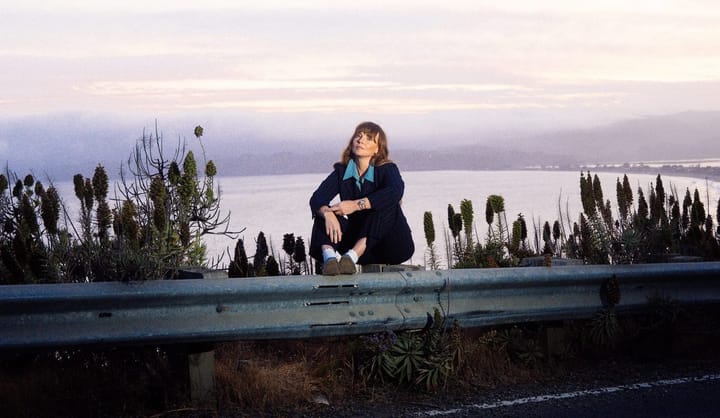In Winston-Salem, North Carolina, where more than a few people own decorative license plates reading "Tobacco Pays My Bills", you can take the Waughtown Street exit and then maneuver toward the Alvarado Joyeria. That's a jewelry store, and that's where you turn on your way to the Johnson-Howard-Robinson Home of Memory, where they came on a warm January afternoon to pay respects to Willa Mae Buckner, The Snake Lady.
Rev. Sam Hickerson, who'd never met Willa, officiated at the service. He wondered out loud what it was about this lady that could have brought such a diverse group of mourners together. He didn't know that the answer lay not only in the kindness of her sweet old soul but also in her bawdy songs, her carnival background and her great love of the Devil's own metaphor.
"She was a good friend," Tattoo Joe said after the service. "She had her snake show back when I had my freak show, and we traveled around together. First time I saw her I went to see her show, and I looked at those snakes and said, 'They'd make nice boots.' She heard me and cussed me out. She cussed better than a sailor."
Tattoo Joe has a hairless dog with elephantine skin, which is nothing close to what it would take to shock Willa Mae Buckner. "There ain't but like five hairs on his whole body," Joe said as he opened his Chevy hatchback and unleashed the elephant dog. The group of mourners gathered around the canine, happy that all vestiges of what Greil Marcus calls the old, weird America were not gone from this world.
But Willa -- who spoke seven languages, loved Jesus and prayed often, messed with an old black hoodoo pot, stripped at Midnight Rambles in the 1940s, started Christmas shopping in the summer, swallowed swords, and sang "Let Me Play With Your Yo-Yo" at Carnegie Hall -- Willa Mae Buckner is gone. In her life she was shot, slurred, hassled and harassed. She never left home without lipstick, high heels and a knife, and she knew how to use all of those to best advantage.
"She was a combination of Granny on the Beverly Hillbillies and some seriously crazy black burlesque queen from back in the day," said blues legend Taj Mahal. "Willa Mae was as real as it's going to get in this century, or in the next."
As to what Willa Mae Buckner meant to American music in the twentieth century, it's hard to say. Her libidinous signature songs, "Peter Rumpkin" and the aforementioned yo-yo treatise, are not particularly well-known, and her music is available only on two compilations distributed by the nonprofit Music Maker Relief Foundation of Pinnacle, North Carolina.
Buckner was a genuine trailblazer, though, an attraction on the ill-documented carnival and medicine show circuit. Like long-dead medicine show vets Pink Anderson and Peg Leg Sam, Willa borrowed liberally from vaudeville, knowing full well that the strange, sexy or hilarious was more likely to draw paying customers than the heartfelt and forlorn.
Pink gave a first name to a famous British art rock band, and his songs on the jukebox helped a young Arkansan named Johnny Cash want to become the Man In Black. Peg influenced Lyle Lovett indirectly, through brilliant Texas songwriter Eric Taylor. Taylor spent an evening with Peg in Anderson, South Carolina, and worked up a version of the blues classic "Delia", later passing that version along to Lovett at a Houston listening room. Peg's lyrics finally appeared square in the middle of Lovett's "Since The Last Time" on his 1992 album Joshua Judges Ruth. "Lyle credits me in the liner notes, but he should have credited Peg," Taylor acknowledged.
No one credits Willa, but her contributions to the shady, time-dimmed world of traveling shows are many. "All sorts of people were at those shows," Mahal said. "It has to go somewhere."
Tim Duffy runs the Music Maker Foundation, which assists the indigent blues musicians Duffy calls the "true pioneers of Southern musical traditions." Guitar Gabriel, who performed in some carnivals with Willa, introduced Duffy to the Snake Lady.
"Any town we would go, old black folks would recognize her," Duffy said. "She was from the pre-television, segregation era, and Willa was a star. People think the blues is just Muddy Waters. In Southern, working-class African-American communities, though, they might not even know who Muddy Waters was, but they know Willa because she came to play the tent show every year. Three generations of people came out to see her snake shows."
Born June 15, 1922, in Augusta, Georgia, Buckner said she had a happy time of it until her mother died when Willa was 11. Before that, her home was something of a neighborhood hangout. "They liked my daddy's home brew, but they favored my mama's moonshine," Buckner told Hampshire College student Carolyn Tennant, who wrote a college paper about her. Willa Mae remembered fish fries at the house, complete with loud music and dancing. "You know I was out there shaking my to-tee-to."
Her mother's death was followed by father Freddie Morgan's hasty remarriage. Buckner said she was treated unfairly by her stepmother; she left home at age 12 and spent a year at her uncle's house in Winston-Salem. One night when Willa was 14, she attended a minstrel show belonging to either Jimmy Simpson or Jimmy Samson (sources offer varying spellings). By morning she was dancing in the chorus line. She eventually moved into a more prominent role, performing risque blues songs for the men who would gather:
Brother Jim, what's we gonna have for supper
The heck with a man who's got a wife
And don't know how to.
Fumble dumble, all night long
Whiskey's in this glass
Anybody here don't like this song
They can just.
Kiss me once, kiss me twice
It's been a long, long time
Willa accompanied herself on piano, which she said she learned at age 21. She taught herself to play guitar midway through her next decade, and would gig at clubs or at minstrel shows.
But she didn't just sing and play at the Midnight Ramble posing shows. When the carnival closed its doors to children, she'd stand naked behind a curtain until the curtain opened. Then she would remain motionless for a couple of minutes, until the curtain closed.
"You couldn't move a muscle," Willa explained to friend and blues chronicler Gaile Welker. "It was against the law to move while you were doing that, and the law would watch you on that stuff, too! They could close down a show if you messed up."
Buckner worked all sorts of carnival shows in the early years of her career. "I worked the nail bed," she told Welker. "I ate fire. I also did the bronze dance: That's where you go all over the body with mineral oil and you put that gold paint on. You did contortions when you were in that stuff, and if you weren't careful you'd fall flat on your rear or your belly."
In 1946, Willa decided to get off the road and settle in Spanish Harlem. She sewed, worked at restaurants and in other people's homes, and studied foreign languages at night school. She also took lessons in tap and gypsy-style belly dancing and played with a Calypso band in small clubs.
She was 42 when she began making plans to get back on the road. The 1964 World's Fair was held at Flushing Meadow in the New York City borough of Queens, and among the featured performers was a Moroccan snake handler. In an interview with Tennant, Buckner said she thought to herself, "If this man can come to my country and make money showing snakes, I'll bet I can, too."
And, as it turned out, she could. After building a healthy collection of 28 snakes, she went to Philadelphia, bought a truck and a tent, and joined up with a traveling sideshow. She began billing herself as Princess Ejo, The Wild Enchantress or The World's Only Black Gypsy, and her snake shows were popular facets of various carnivals.
"She would stand in the pit and talk to the people, tell them about the snakes," recalled Tattoo Joe, who says his friendship with Willa was a natural development, despite the segregation-era South's discouragement of such relations. "Race was never a problem with carnival people," he said. "Back then, carnival people stuck together."
Duffy heard Willa talk many times about her snake show days. "She'd let all those snakes out on the side of the highway and go walking through a field with them," he said. "When she wanted to get back on the road, she'd go hide behind some bushes. The snakes would get scared and go back to the truck."
While Willa was still not afraid to show some skin, her 1960s snake shows were mostly educational. She'd lecture about the animals while snakes slithered around in a pit or draped themselves over her body.
In 1973, Willa's truck broke down and she left sideshow life to settle near her family in Winston-Salem. She took a job as a city bus driver and curbed some of the behaviors she'd acquired along the way. "She quit smoking and went to church for a few years when she was a bus driver," Welker said.
She kept the snakes, though, and remained a well-known figure in East Winston-Salem, where people gathered for bootleg booze at drink houses such as Eizel's. "The first I heard of her I was at Eizel's with Guitar Gabriel in 1989," Duffy said. "This old lady came by, offered to sell Gabe an old Epiphone guitar and walked out. A couple of days later I was at the same place and she got up on a table and started singing these outrageous songs."
Thus began Willa's third round in the spotlight. In January 1994, Duffy founded the Music Maker Foundation and began spreading the word about Willa and other "forgotten heroes of the blues," including Winston-Salem basso-profundo Captain Luke, gutbucket howler Macavine Hayes and the mysterious Mr. Q.
That same year she went back to New York, this time to play Carnegie Hall as part of a show called Circus Blues, sharing the stage with Guitar Gabriel, Duffy, old carnival friend Diamond Teeth Mary and others. "Willa was a great performer," Duffy said. "She exuded sex appeal. I'd bring friends to see her and they couldn't understand how this skinny old lady could turn you on like that. I imagine when she was young it must have been completely outrageous."
"She loved to communicate with the crowd," said Winston-Salem writer John Creech. "She probably developed that ability from the hoochie shows of her past. She had gorgeous eyes, and they looked even bigger behind her glasses, and she had a face that was hard not to stare at for its warmth and beauty."
Buckner played numerous Music Maker package shows, some underwritten by a major tobacco company and presented as the Winston Blues Revival ("Tobacco pays my bills," indeed). Taj Mahal headlined some of those performances, including one at Charlotte's Neighborhood Theater in February 1999.
"I would like to do that as part of a striptease," Willa said that night as Taj sang from the stage about how big legged women are coming back in style. "I think it would be appropriate."
Backstage, Willa looked a visitor up and down. "Have you seen my baby?" she asked, and pulled a photograph of a yellow python from her purse. Conversation then turned to carnival days. Willa remembered Lobster Boy, who used to travel the circuit. "He had hands just like a lobster, and he got married and his daughter had the hands of a lobster, too," she said. "We have so much to be thankful for."
By the summer of 1999, Willa's mind and body began to shut down. She made it through the holidays, dying early in the morning on Jan. 8.
Her death was cause for remembrance. Mahal noted her skill as a businesswoman: "I don't think there's any era that could have repressed her," he said.
Creech recalled her laughter, and her skill as a put-down artist. He'd call out to her during a performance, yelling, "I'd like to play with your yo-yo," and she'd put a hand on her hip, point at him and say, "Boy, you got to be a man to be with this lady."
At the Home of Memory, they dressed Willa up in a pretty blue outfit and put a wig on her head. She didn't look like a tough old carnie. Duffy and former LaFace Records session man John Ferguson played "Do You Know What It Means To Have A Friend?" before the service, and many in the congregation sang through tears. Duffy was playing Willa's old Epiphone.
"We are graveyard sons and daughters passing through an unfriendly world," Rev. Hickerson reminded the 30-or-so assembled at what the Home of Memory billed as Willa's "Homegoing Celebration."
The world may have been unfriendly, but Willa Mae Buckner was not. Here was a woman who would sing for laughs when she couldn't sing for money, who worried over the comfort of snakes, thanked God that she didn't have lobster hands and empathized with the carnival man who did.
"I didn't learn anything," she said after that February show at the Neighborhood Theater. "But at least I saw something."
Peter Cooper lives and writes in Spartanburg, South Carolina.




Comments ()